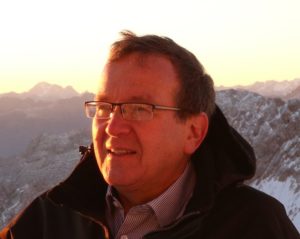Friday, February 2, 2024
2:00pm-3:00pm
Mechanical Engineering Building, MC102
5 King's College Road
Interested members of the U of T community who would like to attend the seminars can email Kendra Hunter at hunter@mie.utoronto.ca
Professor Eberhard Bodenschatz 
Max Planck Institute for Dynamics and Self-Organization
Fluid Transport in the Third Ventricle of the Mammalian Brain
Abstract
Cerebrospinal fluid transports many physiologically important signalling factors through the ventricular cavities of the brain. Cerebrospinal fluid transport is driven by changes in blood pressure, by the source of fresh cerebrospinal fluid produced by the choroid plexus, a secretory epithelium that extends into the cerebral ventricles, and by beating bundles of cilia on ependymal cells lining the inner walls of the ventricles. In the ventral part of the third ventricle, the currents are mainly driven by cilia. In the mouse, we have shown that fluid transport is directed along the walls and has sharp curves and whorls that pump CSF and its cargo directionally on the surface and into the bulk of the ventricle. We will report on a detailed experimental analysis of fluid transport through ciliary bundles and explain the different microflows and their transport principles. We will also show by numericall simulations that provide insights into the experimental understanding of the observed behaviour.
Biography
Eberhard Bodenschatz studies the fundamental physics of active complex systems. He works on fluid physics ranging from microfluidics to large-scale turbulence and cloud physics, and on dynamical self-organisation in cellular biophysics from cells to organs, as well as in bottom-up synthetic biology. He applies the knowledge gained from these fundamental research activities to both natural and engineered systems, investigating how turbulence and thermal convection affect cloud physics, as well as how to create artificial cells, engineer heart muscle, and develop strategies for treating human cardiac arrhythmias. He is Scientific Director at the Max Planck Institute for Dynamics and Self-Organisation in Göttingen, Germany, and Adjunct Professor of Physics and Mechanical and Aerospace Engineering at Cornell University, USA. He was Chairman of the Chemistry, Physics and Technology Section of the Max Planck Society. He is an elected member of the German Academy of Sciences Leopoldina, the Academy of Sciences of Lower Saxony and the American Association for the Advancement of Science. He is a Fellow of the APS, Euromech, EPS and IOP.
MIE’s Distinguished Seminar Series features top international researchers and leading experts across major areas of Mechanical Engineering and Industrial Engineering. The speakers present about their latest research and offer their perspectives on the current state of their field. The seminars are part of the program requirements for MIE Master of Applied Science and PhD students. The Distinguished Seminar Series is coordinated for 2023-2024 by Associate Professor Eric Diller.
View all upcoming MIE Distinguished Seminars.